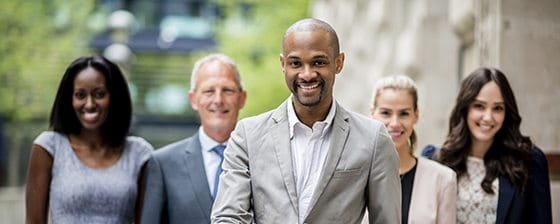

Are you sure you know the strategic value of hiring for diversity in your organization?
Beyond the traditional legal rational for hiring diverse talent – granting everyone equal access to employment opportunities – diversity today opens up the deep wells of talent that often lay hidden in candidates with different backgrounds, experiences, preparation, and economic status.
Indeed, as the war for talent grinds on, it is more important than ever to mine these sources because of the benefits of a diverse workforce demonstrably provide. To wit: Scientific American summarized a number of studies in 2014 showing that culturally diverse teams were better at solving complex, non-routine problems, just like teams of people with diverse expertise are able to do.
Moreover, according to McKinsey, diverse companies perform better financially. The McKinsey research shows that companies in the top quartile for ethnic diversity are 35 times more likely to achieve better financial results than their less-diverse peers.
How does behavioral interviewing fit in to this picture?
Interviews are one of the last experiences a candidate will have on the way to a job offer. But numerous barriers keep qualified diverse candidates from having that experience. However, suppose your company is doing everything it can to eliminate potential boundaries to attracting and considering good job candidates – such as the following:
You have made the job description appealing, including why it’s important and meaningful
Your company has a compelling message for why someone should join
Your company is working hard to keep and promote the diverse talent it already has
You have cast a wide net to include schools beyond the “usual suspects” as sources of recruits
Your resume screen doesn’t eliminate candidates with unfamiliar names or backgrounds that are different from the norm
You have distinguished the knowledge and skills you need at hire from what can be developed on the job
Your recruiting team’s members reflect the employee diversity you hope to achieve
Even with all of most of that in place, you still have the element of unconscious bias operating that affects the interviewer’s information-gathering and decision-making abilities.
When practiced with skill, behavioral interviewing yields good evidence of what candidates have done in the past and reveals whether they have the skills, attitudes and personal qualities needed on the job.
Other than giving candidates the opportunity to perform tasks and solve problems in real time that showcase their skills, behavioral interviews reveal how candidates are likely to behave in the future based on how they have behaved in the past.
Here are five actions that even the most able and motivated interviewers should take to make the most objective assessment of a candidate’s suitability:
Put first impressions aside.
Physical appearance and body language can unfairly prejudge a great candidate. Body language that communicates engagement in one culture may appear disrespectful in another. Eye contact, a firm handshake, and smiling can communicate engagement in some cultures but can be signs of disrespect, embarrassment, or discomfort in others. Be aware that these impressions of a candidate, which are appropriate to their cultural background, often give false signals of his/her unsuitability or lack of “fit”. (Telephone interviews can eliminate many of the biases that enter the picture when interviews are conducted in person.)
Use a consistent process.
Prepare your questions in advance and put them into an interview guide to use with each candidate. Then everyone is literally on the same page. The guide should also include what to listen for that points to the qualities needed in a successful hire – resourcefulness, initiative, judgment, empathy, and self-confidence, for example.
Ask for situations that mirror key job challenges.
Coming up with good behavioral interview questions is easy, once you understand what makes the job especially hard to do and what it takes to be successful at it. If the job involves dealing with difficult customers, ask about a time you had to deal with a customer who was upset; if the job involves problem solving, ask about a situation where you had a problem that others were unsuccessful at solving. In other words, turn the biggest challenges into interview questions.
Be curious about the person and the story.
Good candidates often come up with situations that are unusual and not exactly the kinds of situations you might be expecting to hear. The key is to pay less attention to type of situation that the person is talking about but the story itself: how he/she first got involved, what was especially significant about it, what he/she did, thought about and said to other people in the story, and how it turned out. A good interviewer is like a good investigative journalist, not a commentator – they report the facts, not their own opinions.
Suspend judgment until the facts are in.
This may seem counter-intuitive: isn’t the interviewer’s job to make judgments about the candidate’s qualifications? The answer is yes, but it’s not about making premature judgments. This is very hard to do – people do this all the time by nature. However, good behavioral interviewing discipline involves asking for lots of detail about what the candidate did, what thoughts and reactions he/she had, and the manner in which he/she dealt with obstacles. Once the interview is over, review the evidence you have gathered against the hiring criteria and then make your assessment.
None of these tips is easy. That’s why interview training programs don’t always produce the desired results.
Interviewers who are more successful tend to be naturally curious about people and ask more questions than give answers. They like learning about other people and what makes them tick. They judge people more on the quality of their character than on personal appearances. And they have shown an open mind about the types of people with whom they would want to work or have working for them.
Just as it’s important to screening candidates for the right stuff, perhaps organizations should also put people into the interviewer pool who meet some of these criteria as well.



